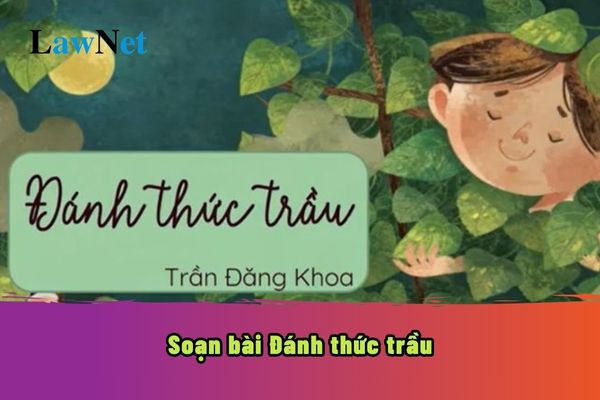What are the guidelines for preparing the lesson "Đánh thức trầu"? What are the general objectives of the 6th-grade Literature curriculum in Vietnam?
What are the guidelines for preparing the lesson "Đánh thức trầu"?
The poem "Đánh thức trầu" is a unique and meaningful piece of folk poetry. Through the work, we can appreciate the beauty of the Vietnamese language, the subtlety in observation, and the expression of the people. At the same time, the poem evokes beautiful memories of childhood and a love for nature.
6th-grade students can refer to the following sample lesson "Đánh thức trầu":
|
Guidelines for preparing the lesson "Đánh thức trầu" 1. Main Content and Meaning of the Poem |
*Note: The information is for reference purposes only./.

What are the guidelines for preparing the lesson "Đánh thức trầu"? What are the general objectives of the 6th-grade Literature curriculum in Vietnam? (Image from the Internet)
Are nurturing the soul, forming character, and developing students' individuality the general objectives of the 6th-grade Literature curriculum in Vietnam?
Under the General education program in Literature issued together with Circular 32/2018/TT-BGDDT, the general objectives of the Literature curricula are defined as follows:
- To form and develop in students the essential traits: of patriotism, compassion, diligence, honesty, and responsibility; to foster their souls, shape their personalities, and develop their individuality.
- Literature helps students to explore themselves and the world around them, to understand humanity, to enrich their spiritual life, and to have a humanistic outlook on life and behavior; to have a love for the Vietnamese language and literature; to have a consciousness of the origins and identity of the nation, thereby contributing to the preservation and development of Vietnamese cultural values; to possess a spirit of embracing human cultural essence and an ability for international integration.
- To contribute to helping students develop general competencies: self-discipline and self-learning, communication and cooperation, problem-solving, and creativity.
- Literature helps students develop language proficiency and literary ability: to train skills in reading, writing, speaking, and listening; to have a fundamental knowledge system of Vietnamese and literature, to develop figurative thinking and logical thinking, contributing to forming the fundamental scholarship of a cultured individual; to know how to create common texts; to know how to receive and evaluate literary texts in particular, communicative products, and aesthetic values in general in life.
Thus, nurturing the soul, forming character, and developing individuality for students are common objectives of the Literature subject in general and the Grade 6 Literature in particular.
What are the objectives of the 6th-grade Literature curriculum in Vietnam?
Under the General education program in Literature issued together with Circular 32/2018/TT-BGDDT, the objectives of the 6th-grade Literature curriculum in Vietnam are defined as follows:
- Help students continue developing the good qualities formed at the primary level; enhance and expand the requirements for quality development with specific expressions such as: being proud of national history and literature; having dreams and aspirations, having a spirit of self-study and self-respect, having a sense of citizenship, and respecting the law.
- Continue developing general competencies, language competence, and literary competence formed at the primary level with higher achievement requirements. Develop language competence with the requirement to:
+ Distinguish types of literary texts, argumentative texts, and informational texts; understand both explicit and implicit content of different types of texts;
+ Write coherent, logical, procedural narratives, descriptions, expressions, arguments, explanations, daily life essays, and integrate methods of expression; speak clearly, and coherently; have a confident attitude appropriate to the communication context; listen and understand with a proper attitude.
- Develop literary competence with the requirements to:
+ Distinguish genres like stories, poetry, prose, and scripts, and some specific sub-genres;
+ Recognize the characteristics of literary language, recognize and analyze the effects of formal elements and artistic devices associated with each literary genre;
+ Recognize expressive value, cognitive value, and aesthetic value; analyze imagery, content, and form of literary works; be able to create some literary products.

